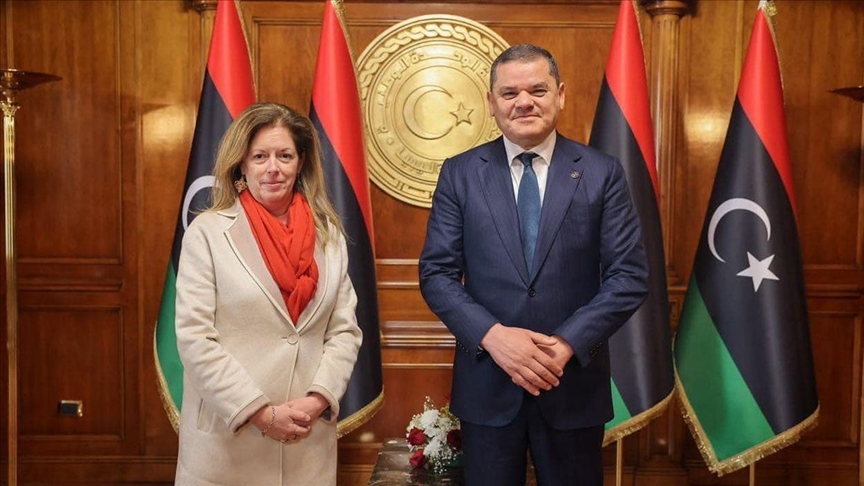UN's Libya adviser discusses latest developments with Dbeibeh, Bashagha
Stephanie Williams meets separately with interim premier and prime minister-designate

TRIPOLI, Libya
The UN Secretary-General’s Special Adviser on Libya, Stephanie Williams, discussed the latest developments in the country in separate meetings Sunday with interim Prime Minister Abdul Hamid Dbeibeh and Prime Minister-designate Fathi Bashagha.
According to the Libyan government's official Twitter account, Williams and Dbeibeh met at the office of the Prime Ministry in Tripoli.
Dbeibeh told the UN adviser that work is continuing to "complete the roadmap determined at the Libyan Political Dialogue Forum (in Geneva) and to create the appropriate conditions for holding national elections and a constitutional referendum this year.”
Separately, Williams said on Twitter that she discussed "recent developments and the votes taken by the House of Representatives to adopt a constitutional amendment and designate a new prime minister" with Dbeibeh.
"We reviewed the process underway and I reiterated the importance for all actors and institutions to work within the political framework and, above all, to preserve calm on the ground in the interest of Libya’s unity and stability," she said.
Williams further noted that the UN "remains committed to raising the voices of the 2.8 million Libyans who registered to vote."
She also shared details of her meeting with Bashagha, saying she "highlighted the need to go forward in an inclusive, transparent, and consensual manner, and to maintain stability in Tripoli and throughout the country."
"I stressed that the focus must continue to be on the holding of free, fair & inclusive national elections in the shortest possible time," she added.
During meetings of the UN-led Libyan Political Dialogue Forum In November 2020, it was decided that presidential and parliamentary elections in Libya were to be held on Dec. 24, 2021.
However, due to the failure of the House of Representatives and the State Supreme Council in Tobruk to agree on the law determining the legal infrastructure, the elections were not held on the planned date.
On Feb. 10 this year, the House of Representatives convened to elect a new prime minister, claiming that the mandate of the current Government of National Unity expired on Dec. 24.
Bashagha was elected prime minister during the session, with most of the deputies in the west of the country not attending.
Dbeibeh pledged earlier that he would “accept no new transitional phase or parallel authority” and would hand over power only to an elected government.
The UN said it still recognizes Dbeibeh as Libya’s interim prime minister.
*Writing and contribution by Merve Aydogan in Ankara
Anadolu Agency website contains only a portion of the news stories offered to subscribers in the AA News Broadcasting System (HAS), and in summarized form. Please contact us for subscription options.







